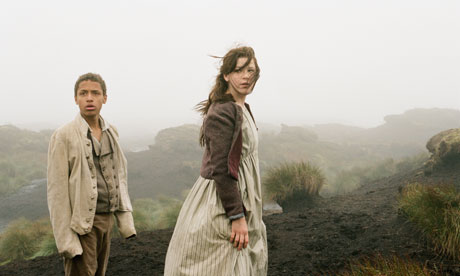by Matthew Gregory Lewis
Published: 1796
Link:
https://librivox.org/the-monk-a-romance-by-matthew-lewis/
Listening Time: 16 hours 17 minutes
Quote:
"Would you feign penitence, and again act an Hypocrite's part?"
Theme: Virtue, hypocrisy
(I think it's super cool I got to buy volume three of this book on ebay.
I could have gotten all three, but they were real expensive.
But still... #chills!!)
In Northanger Abbey, there's this one part where Catherine Moreland dances with this guy at a party and she wants really bad to like this guy because he's her best friend's brother
and her brother's best friend.
So she tries to break the ice:
(Catherine's a total book worm)
Catherine is a bit disappointed with her partners response:
"I never read novels; I have something else to do. Novels are all so full of nonsense and stuff [...] except The Monk; I read that t'other day; but as for all the others, they are the stupidest things in creation."
To people in Ms Austen's day, this response tells a lot about the type of person Catherine's partner, Mr Thorpe, is. Pretty much everyone back then (with the exception of Clergymen's daughters, apparently) was familiar with "The Monk" by it's reputation. It was infamous for it's lurid and edgy content.
I like to think it would be sort of like if I went to a church dance today and the guy I was dancing with says:
"Books are dumb...but I did enjoy Fifty Shades of Gray,"
(
...and he's saying it in earnest.)
It's probably a reflection on how desensitized modern society is by this type of violence and perversion because I found that, content wise, this book is not too different from the types of things we would watch on TV today.
The first 38 minutes of this librivox recording is basically the narrator apologizing for how mediocre the story is going to be. By the time I got to the end of that, I was prepared for a mindless read. I thought,
"OK, this book is going to be laughably ridiculous. I'll have fun...bring it!"
It wasn't like that at all. I mean, Mr Lewis isn't the worlds best author or anything but he psychologically
gets his characters. He's making a point and I can't discount it because in some ways I feel that it's still relevant today.
___________
The story follows several different sub-plots, but there are two central characters who tie them together: Ambrosio (the monk) and Agnes (a novitiate nun). These two people only talk to each other, like, once in the whole story, but their interaction is basically the crux of the story: the central feature that ties all the various sub-plots together.
I also think that the two characters follow parallel paths (they were both destined for a life of service from a young age, and they are both not quite suited for it personality-wise as they'd like to be) so it's interesting for me to compare their character arcs.
Ultimately though, neither of them is the hero of this story.
I called him Antonio through the whole story because the big plot twist on, like, the very last page was SOOOOOOOOOO obvious from chapter 1.
I think that this is intentional. Ambrosio's character arc is kind of like Oedipus': the thrill isn't from suspense as much as it is from anticipation.
A while back (before I read this book) I got to watch a comic-con panel with these authors talking about writing devices and character development: things like The Heroes Journey, Heroes and antiheroes. And I got to ask them a question about villains, and I got an answer that I think applies to what's happening in this story to Ambrosio:
(I am paraphrasing here, they didn't use these terms exactly)
'Becoming a hero is about becoming a better man, becoming a villain is about becoming the man you already are underneath.'
Mr Lewis actually says something to this effect in the book: All throughout his life everyone thought Ambrosio was being selfless and devout, but he was really just competitive: he wanted to be a better monk than anyone else. These traits are not bad in themselves, they would actually serve him really well if he were in the military, but in the life of a man who's compelled to be restrained, and who's life is devoted to service and piety...they've been warped into something truly malignant and ultimately monstrous.
Agnes is far from perfect however, however, when she does something wrong she actually makes an effort to try to make it right. Unlike Ambrosio, she was raised in a normal family, so she knows there are other paths of life that she could follow. She has a healthy outlet for behavior that would otherwise be destructive. Ambrosio doesn't see his life that way.
Unfortunately for Agnes, though, she's a woman and because she wasn't raised as part of the establishment like Ambrosio was, the punishment for her misconduct is extreme.
Ambrisio's actions (until the very end) are pretty much ignored by everyone, even after people start to become suspicious of him, because he's in a position of authority and no one wants to challenge him. As far as the establishment is concerned, Agnes is a nobody and they seem to think nobody would notice if she disappeared off the face of the earth.
Fortunately that's not true. Agnes
does have people who love her and who'll go at great lengths to get her back. However it will take even more than the valiant efforts of our heroes to overthrow the corruption that's festering in the abbey.
(Fortunately the Inquisiton is here to save the day!)
I can't recommend this story for everyone, but for me it was haunting not because of the supernatural elements, but because I feel that psychologically it was so on point.
Being raised away from corrupting influences (or sheltered) does not ensure that you'll grow up to be a good person. Ambrosio would like to be able to blame his corruption on the demons but even Rosario was only using what was inside him already, and that was quite enough to work with.
In the Bible, Jesus talks about how the stuff you consume isn't the what pollutes your heart; it's what comes out of your heart that determines who you are. I get that this can be a difficult concept to practice, and to teach. It's easy to tell people what they should and shouldn't do:
Don't watch R rated movies, don't watch porn, don't swear, don't dance too close to your partner, don't kiss passionately...
It's
A LOT harder to teach people what to
be.
We can't see what's in another person's heart; we can only see (and judge them) by their actions. You'd think protecting people from exposure to evil (particularly at young and impressionable ages) gives them opportunity to develop their psyches free of a corrupting influence. But in reality it's not that simple. A lot of the time this type sheltering and focus on behavior control becomes a maladaptive practice in and of itself:
Instead of
"creating a clean heart", people go into the world
unprepared to face temptation.
Instead of
being virtuous, they're just
better actors than everyone else.
Note:
a. I can't believe how many people bought the whole Rosario thing. There's been like, three or four people who say things like "But I really thought she luvvved him...she cried that one time." PUH-LEASE! Her tactics were the most obvious thing in the story>>>even more obvious than Ambrosio's 'Secret identity'. The only reason Antonio/Ambrosio fell for it is because he has no idea how actual human women actually talk. He spend 27 years in a monastery...since he was three years old!
b.There is a lot that's dark and disturbing in this story, but the most horrific of the material didn't have to do with violent or explicit acts, or even the demons out to get you (cuz the demons can only use what you already have in your heart).
The most disturbing part of the story is towards the end where there is this really unnerving conversation between Ambrosio and a young kid. You really see he's truly become a predator and starts subtly testing his intended victims' sexual knowledge so he can see in what ways he can take advantage of her. It was horrible, because those are the same tactics sexual predators use today. It was really difficult to get through that part.



















